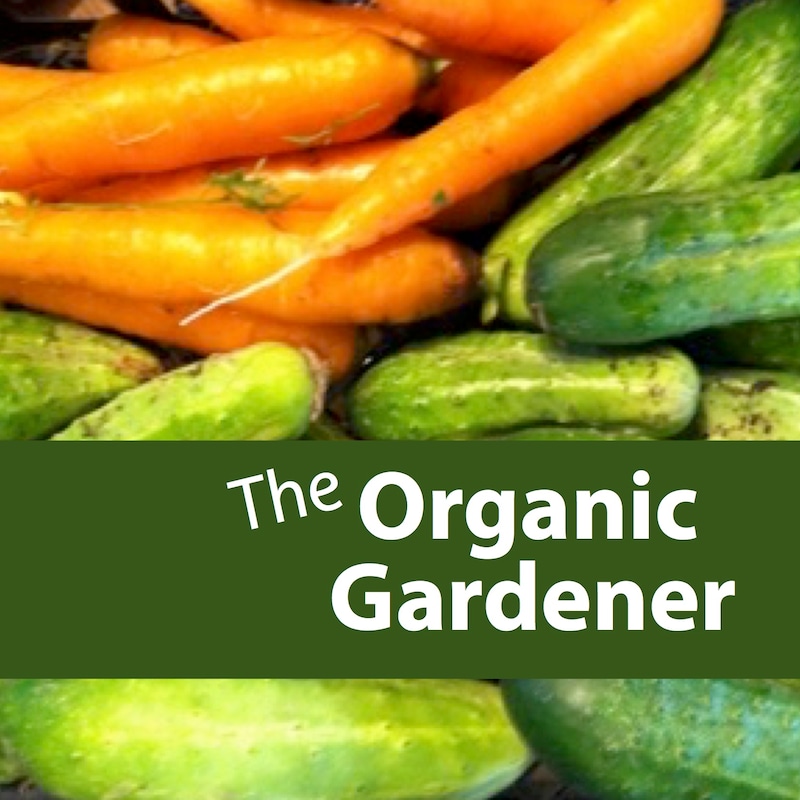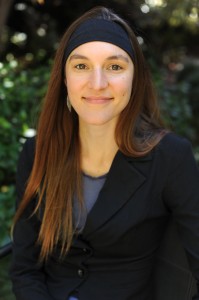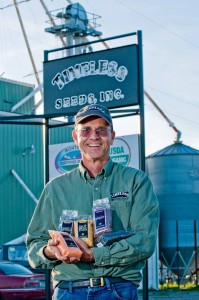
Shownotes
Replay of my interview with the engaging storyteller Liz Carlisle from December 2015 because she asks the important question if we know these are best farming practices why aren’t we following them?
I am very excited to introduce my guest today who has written the Lentil Underground: Renegade Farmers and the Future of Food in America, one of the best books I have read this year about some amazing Montana Farmers. A great story teller, I think you will be inspired not just by the tale of these visionary and dedicated farmers who stuck with growing organic lentils against some amazing odds, but you will also learn about how simply adding a new food like lentils to your diet can help change the world!
Liz Carlisle is a fellow at the Center for Diversified Farming Systems at the University of California, Berkeley. She holds a Ph.D. in Geography, also from Berkeley, and a B.A. from Harvard University. A native of Missoula, Montana, Carlisle is a former Legislative Aide to United States Senator Jon Tester.
Tell us a little about yourself.
My name is Liz, I am originally from Montana, I didn’t grow up in a farming family but my dad had this great garden, and my grandma was a farmer and she had lost her family farm in the dust bowl. So grew up in Montana hearing these stories about why its so important to make our agriculture sustainable. So that’s how we got interested in Organic Farming, I didn’t even know it was called organics then.
Fast forward a few years, my first career was as a country singer, so I was traveling around the country, and meeting farmers from all over the place and I realized people were having some of the same problems actually my grandmother’s family had in the dust bowl with the industrialization of agriculture essentially. Using too many chemicals, and soil health was declining and farmers were seeing those problems and having other kinds of problems with the industry associated with conventional agriculture as well, so I wanted to try to be part of the solution.
I heard about Jon Tester of course when he ran for senate that made a lot of news, this organic farmer, made his ways in the halls of government. I went to work for him, so I quit my job as a country singer. And though that work, met all of the innovative farmers from around Montana. ‘Cause my job was as liaison for the state and get ideas for a policy team. I realized we had such an innovative group of or organic farmers and gardeners in Montana who took it upon themselves to find more sustainable systems and that was the inspiration for me to go back to grad school and do this book project to write the origins about the organic movement in Montana.
In case listeners don’t know or didn’t catch it, Jon Tester is our Senator from Montana and he grew up and has a huge farm in Big Sandy and is still our Senator from Montana today. So how do you go from country singer to lisason out of Washington, DC?
Well i pretty much told them the story I told you. So I quit my job as a country singer, and knew I wanted to go to work in sustainable agriculture and I came home to Montana and this position was advertised it was called legislative correspondent for department of ag and natural resources for the office of Jon Tester. I didn’t realize based in DC at first, I thought it was a position in the state and I went in for an informational interview and I was sold on the job before I realized I’d be moving back to the East Coast. I think they heard the honesty and motivations for doing it. I had a college education and I knew about writing and story telling. It just worked out, it was a great education for me in addition to the senator he had a lot of incredible Montanans, with a long history of doing natural resources collaborative work. It’s kind of like a masters degree just working in that office.
What did you end up getting your masters in?
So I went straight from that to a PhD program in Geography at UC Berkeley. What I really liked about geography was I could study both natural science and social science so I could get both of those aspects of how do we make transition to a more sustainable food system and focus on a policy angle as well as learning some of the ecology behind why do we rotate certain crops, what do we need to do to take care of water, our soil and all these resources at the heart of food system.
Who’d of thought would come out of a geography degree?
Right! We do more then maps!
So then you came in the spring and went to Timeless Seeds with David Oien?
I had met a few of these organic farmers through my work in the Tester office, they started telling me, the key to doing organics in Montana is we have these monocultures in wheat in Montana now and in order to convert them to a system that doesn’t rely on chemicals. These wheat mono-crops rely on the chemical fertility. We have to put the nitrogen back in the soil that the wheat keeps using up. So in order to go organic we need a crop that would make it’s own nitrogen.
All of the crops in the legume family do! Your listeners know organic gardening 101 you gotta to fix nitrogen! So anything in the bean family will do that. These farmers needed a crop that they could also market. And they needed a crop that worked in Montana’s climate. So they hit on lentils. I kept hearing from people that lentils are so important to be able to do organic farming in Montana.
Lentil Master
And the person who taught me about lentils was … either
David Oien or somebody else who learned from David Oien. This guy who had tried this in the 80s and had built this business with some other farming friends. So what I gathered from that was I really need to meet this David Oien.
So as soon as I had done the coursework in my degree, then I drove to Conrad and interviewed him.
Do you want to tell us about that and how the interviews went, where did you go there?
Super genial guy and had a lot of info to share about his background in farming, what it had been like to how to start a business, to try to make it economically viable to grow these ecologically appropriate crops because you go from hauling your wheat in the elevator to having these lentil and nowhere necessarily to sell them. So he and his friends they had to develop their own processing and their own markets, with the idea if they did that they would be possible for other farmers to add rotations and make the transition to organic.
This was fascinating and this needs to be the focus of my dissertation project and he was kind enough to put me in touch with the network of people who grow for Timeless Seeds. This business that was started to process and market ecologically appropriacte rotation crops, mostly lentils, also chick peas and some ancient grains. Based in Ulm, Montana is where their facility is, right outside of Great Falls.
So the next summer 2012 I spent the growing season interviewing all these people who grow for Timeless Seeds. 15 current growers, and some past growers, and some researchers who collaborate. Overall I probably interviewed 45 people and getting to kind of shadow them in what they did, and get a sense for it. When the organic inspector, I would go along, I’d ride along in the combine, and get a sense of what made this kind of farming different from typical conventional wheat farming. And honestly how they all did it!
How do you start a new farming system from scratch that doesn’t have markets or research to help you think about when should I start planting this? What should the seeding rate be? and so basically came to find that in addition to developing these cooperative systems among plants, and synergies in the rotation crops, they had developed cooperative systems among people. They had figured out ways to share labor and knowledge, certainly to pool their resources to come up with processing infrastructure, so that they could actually, on a certain scale really develop a new food system in Central Montana.
Central Montana is really dry, and part of what inspired them also right in how to grow in an area where you get a lot of drought.
Exactly, rotations are a little bit of an easier puzzle if you get a lot of rainfall. The midwest has been rotating legumes for ages. They’ve been rotating soybeans into corn. They have longer growing seasons and have more rain so that was really the challenge fro the northern great plains, and for central Montana if you have 14-18 inches of rainfall you know you need a certain amount for your wheat crop it doesn’t make sense to rotate anything or you’re gonna be using up moisture that you need.
They just tried it, they looked at other dry lands around the world, and they said we think we can do these legumes, and we can do theses chick peas, these dried peas, it’ll be good to use these cover crops to keep the soil covered, rather then having a fallow year. It’s a great example, when we look at the impacts of what climate change are gonna be in different regions around the world and how we can be more resilient in our agriculture. Central Montana has a lot to offer as a region that has weathered a lot of drought and a lot of volatile weather conditions.
When we were at the AERO conference you talked a lot about if we know this can help farmers be more productive and have a better season then what are some of the challenges and why aren’t more people doing it?
So many different of categories and challenges like that gardeners will recognize this some are just plain agronomic. I’m worried I’m not gonna be able to terminate a cover crop in time, or this is not gonna fit into the other things I’m gonna plant. Some has to do with not as much research, on some of these rotations systems as we have on hybrid wheat that is managed with chemicals. We have so much research we have really dialed in that system, and we don’t have that advantage with some of these organic rotation systems.
The Social Aspect
There’s kind of a social aspect as well, if you live in a rural community and it’s relatively tight knit everybody kind of knows everybody and social life is kind of based on a particular farming system. Everybody’s in the field at the time, they’re used to seeing weed free plants, only one plant, it’s going against the grain, so to speak to do something different. And that can have a lot of social consequences, maybe you use a friendship when you no longer go to the fertilizer dealer, when you’r not contracting to spray, maybe one of your neighbors starts to make comments if your lentils look a little weedy.
That was a you talked about a lot in the book, was neighbors questions what you are doing, and the weed problem.
I think that is resonate for most people who live in a farm community, it’s so visual, it’s such a public occupation, people drive right by and look at your field and they adjudicate it from the framework they have of what successful framework looks like. Diversified farming looks plain different, a diverse organic garden is gorgeous, but if it’s outside your experience and your used to seeing a precise wheat field, you might even see a crop plant and think its a weed that looks different. Plenty of people would see a lentil plant and not realize it was intentional.
Wasn’t that some of the problems they were having was they were little, and how to sort them. Lentils, I read the book over Thanksgiving and I had to give it back. They got their first contract from Trader Joe’s?
Timeless got their first contract with Trader Joe’s, that was their first big buyer, and Trader Joe’s contracted for so much volume they couldn’t buy it all in Montana and they had to bring in some additional lentils.
From Canada right?
Yes, there was a rock in the cleaning process and that’s not unusual for grain, certainly but what’s challenging for people with lentils they are lower to the ground so you can use a conventional combine, people have better luck with some of the older, just drive it a little more slowly. There are some special combine headers that are specifically for lentils, they’re called flex headers.
Another thing that’s funny about lentils compared to wheat, from a climate perspective, they have an indeterminent growth habit, which means they don’t necessarily all mature at the same time, at the same time of year or each other. It’s based on how much rainfall that they get, they grow when it rains and then they sort of pause themselves, go semi-dormant.
So it’s helpful because they can whether periods of drought, ad sort of wait for the rain they’re sort of adaptable in a way, however it makes it harder to plan for them. They sort of mature, not quite all at the same time, and not at a predictable time. So you have a week window when you can harvest them if you harvest too early they will be too green, if you are too late they’ll ripen and they will fall on the ground and you’ll lose them.
You’re kind of judging the median of your crop, because it’s not fully uniform. It takes extra knowledge, so it’s a bigger intellectual challenge for the farmer which is what excited a lot of these farmers, some felt they had hit the limit of their curiosity with the industrial system so they were able to use their brains more by incorporating more diverse crops and having to work with these ecological cycles.
Some of the other challenges if I remember were they had started small, people who had been family farming one way for years, they would start with a small thing and grew as they went.
That was a common story, somebody wanted to convert to organics, they were maybe 30s coming back to a family place and parents were still managing it and they would ask could I have some land to experiment with organics and crop locations, thinking if this pans out maybe they’ll let me do it on more fields. So that’s the way it’s happened on some of these multi-generational farms and it’s happening in Montana right now.
Do you want to tell us about some of the characters that you met?
Character is an apt term, not just in the context of a book. Certainly if you’ve ever been around Montana’s organic farming characters, or a lot of organic communities its full of characters and diverse characters, and that was one of the things that interested me in researching this story why I wanted to tell it. I think there’s this perception that organic gardeners culturally are all of a piece, were all hippies and vote for the same people and have similar liberal beliefs and politically system.
But what I found is people came to organics from really different value system, some cases from deep religious beliefs, some homeschool and devoutly christian, some people came out of the counter culture and were inspired by Rachel Carson’s  Silent Spring and some participated in the marches against Vietnam, and some people very politically libertarian and their concern about the industrial food system was they wanted more independence and corporate and government power that was represented. They all came together believing if we could build a local ecologically food system and had control over our own destiny and weren’t using so many chemicals that would be the right thing.
Silent Spring and some participated in the marches against Vietnam, and some people very politically libertarian and their concern about the industrial food system was they wanted more independence and corporate and government power that was represented. They all came together believing if we could build a local ecologically food system and had control over our own destiny and weren’t using so many chemicals that would be the right thing.
It was the right thing for the bottom line, right thing for the health of our customers and the right things with our land. I was telling you I was at the Montana Organic Association Conference the first weekend of December, a couple of these folks who come from different backgrounds, got into this really deep question about spirituality and institutions and outside of institutional religion, and it just reminded me that the level of dialogue going on as they cooperate making organic farming possible it goes to the heart of the human experience. And in this day and age of really divided politics it’s a pretty refreshing thing.
I think Montanan’s are a special kind of person, you know. I have friends from all different spectrums, and if we can get along just about everybody can.
The Front Lines
Do you want to tell us about some of the people from the farms you went to visit? Like I was excited learn about the Crabtrees by the border.
Doug and Anna Jones Crabtree literally farmer about as close to Canada as you can get without being in Canada. They are 45 minutes of Havre Montana a thriving metropolis!
Well they do have a college.
They are out there in North Havre, it’s interesting, Doug grew up on a farm, lost their family farm in the farm crisis of the 80s. Anna did not grow up on a farm. They met...




